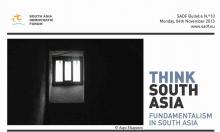-

Indian analysts said the report could damage India's hopes of buying uranium from foreign suppliers following its 2009 civil nuclear agreement with the United States. The deal was aimed at helping India ease its power generation crisis while assuring the international community of its responsible stewardship. It provides for inspection 14 of its 22 nuclear plants and calls for its civil and military programmes to be kept separate.
-

The November 2013 (Vol.4 No. 11) Issue of 'Militant Leadership Monitor' features Animesh Roul (SSPC) 's article on the new Pakistani Taliban leader Maulana Fazlullah.
Jihadi Warlord of Pakistan: A Look at the Pakistani Taliban’s Newly Crowned Leader Maulana Fazlullah
-

A detailed study of the Indian Mujahideen, based on a clinical analysis of curated data, is beginning to pay dividends in understanding when the outfit will launch attacks and who its targets will be.
-

The reality so far in global geopolitics is ‘once a contested land, always a contested land’. The best example has been Jammu & Kashmir (J&K). Over 65 years have passed since the first batch of Pakistani intruders, with the help of army regulars, came face to face with the Indian army, and the violence continues unabated in the J&K. Since then, India and Pakistan have fought at least three major wars and as many skirmishes, with intermittent, mostly half-hearted and ineffective bilateral peace overtures from both sides.
-

A wave of violent clashes that swept Myanmar’s restive Rakhine State (formerly known as Arakan) in late September left at least five Muslims dead and many members of their community injured and displaced. The epicenter of the violence was the city of Thandwe, which was targeted by a Buddhist mob (Mizzima News [Yangon], October 3). For some time now, Buddhist nationalist groups in Myanmar have opposed Muslim businesses and social practices, creating a sense of mistrust and antagonism between the two communities that frequently erupts in violence.
-

Al Qaeda has struggled in the past to gain the support of India’s vast Muslim population. But that’s gradually changing, warns Animesh Roul. Today, he outlines how the fragmented organization is trying to attract money and manpower from the third largest Muslim community on the planet.
-

SSPC's Animesh Roul profiled India's most wanted terrorist Masood Azhar in Jamestown Foundation's Militant Leadership Monitor.
The Jihadi Demagogue: A Profile of Maulana Masood Azhar of Pakistan
September 30, 2013
Maulana Masood Azhar is one of the most dreaded Pakistani jihad leaders within the Indian political and security establishments. Formerly associated with the Harkat troika (Harkat-ul-Jihad-al-Islami [HujI], Harkat-ul-Mujahideen...
-

Animesh Roul was quoted by International Business Times in an article titled "Balochistan: Pakistan’s ‘Dirty War’ In Its Poorest, Most Lawless, But Resource-Rich Province."(September 14, 2013)
-

Aaron Mannes, R.K. Raghavan, Animesh Roul and V.S. Subrahmanian
High-profile arrests of Tunda and Bhatkal tell the story of how India's security apparatus is getting better at border control and intelligence operations. There is a lot more to be done.
-

"Chinese dam concerns raise fears of future water conflict" SOUTH CHINA MORNING POST, 05 September, 2013
Beijing's coyness over hydro plans for Tibet's Yarlung Zangbo sparks mistrust from India over downstream impact on Brahmaputra.
The sensitive issue of water sharing between China and India is again under the spotlight.
India raised its longstanding concerns about Chinese dam construction on rivers that start in China and flow into the sub-continent at the 5th round of the India-China strategic dialogue in New Delhi last month.
Paxton ported to drupal by DropThemes.in